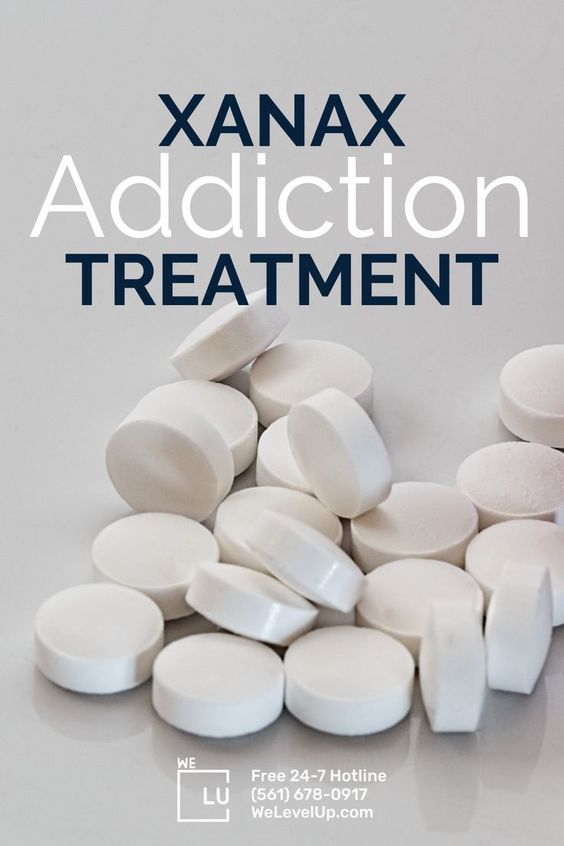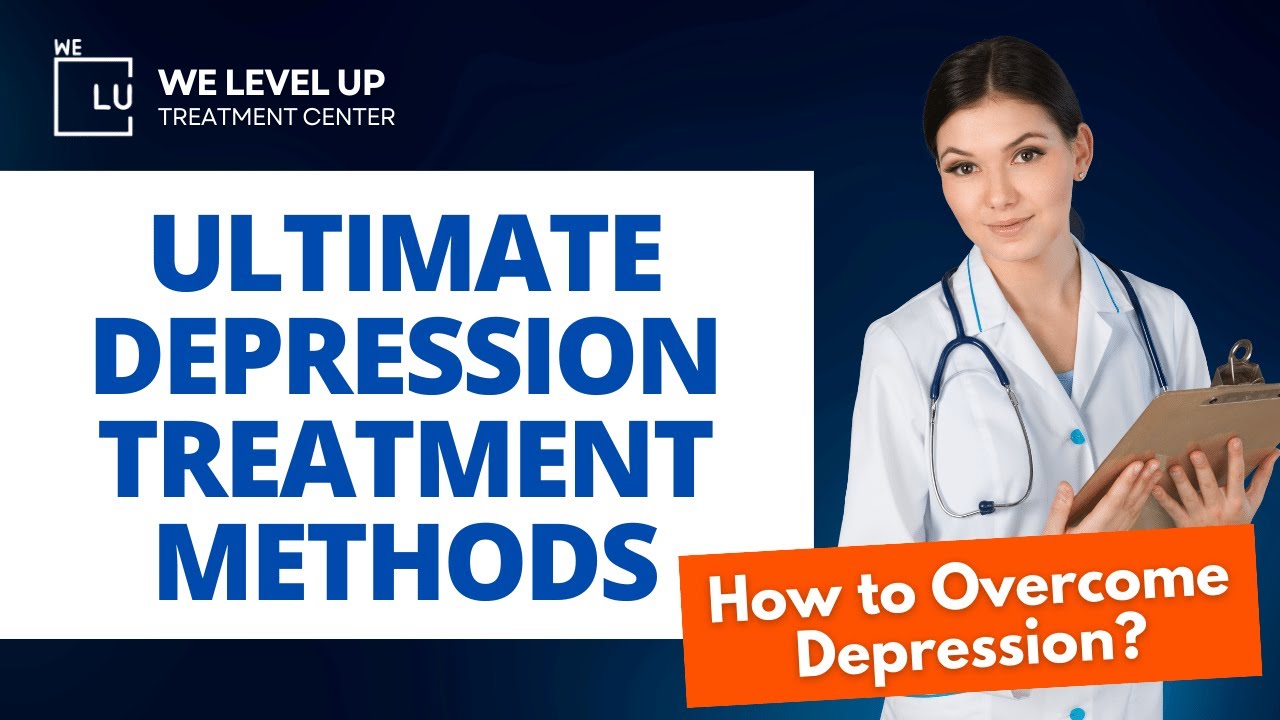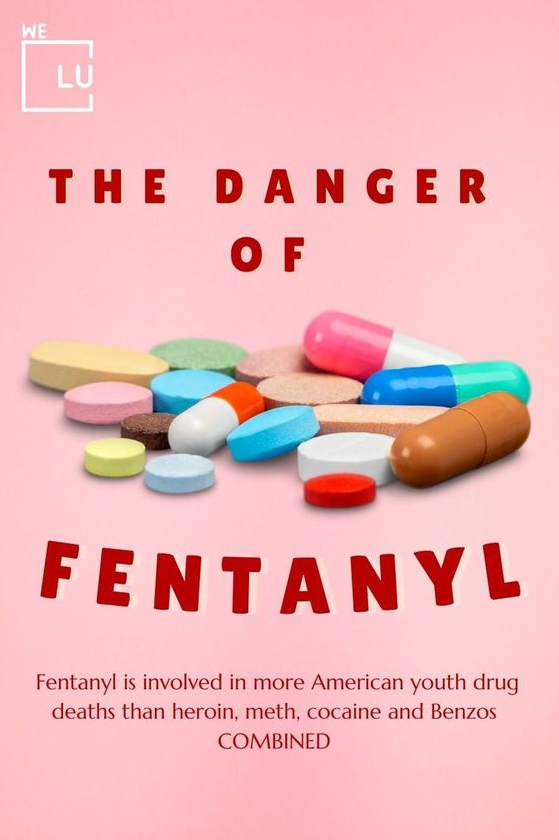Many have had favorable results with Ambien, which their doctors recommended. However, many are also worried about the possibility that you can be dependent on it. So, is Ambien addictive?
People who suffer from insomnia may find it easier to fall asleep, stay asleep longer, or have more peaceful sleep when they take medications known as sedatives or hypnotics. Zolpidem, sold under Ambien, is one of the more modern sleep aids available. Prescriptions for Ambien are typically provided for a maximum of six weeks since, wherever possible, shorter durations are encouraged.
Abusing a lot of Ambien or having long-term use can cause various issues, such as loss of muscle control, depression, withdrawal feelings between doses, and impact on personal and professional life, including family problems, unemployment, bankruptcy, and addiction.
Get facts about Ambien addiction treatment at We Level Up Texas treatment center. Make this your opportunity to reclaim your life. Call We Level Up TX 24/7 for a free consultation. Every call is free and confidential.
What is Ambien?
Ambien is a prescribed medication developed to address insomnia by facilitating quicker and more consistent sleep. As a sedative-hypnotic, it acts on the central nervous system to induce a calming effect.
According to the DEA Scheduling, Ambien has a minimal risk of abuse and dependency. However, prolonged self-medication or long-term Ambien usage can lead to significant physical and psychological dependence, which increases the risk of withdrawal symptoms when you try to stop using the drug.
Slang terms for Ambien include No-Gos, Zombie Pills, Sleepeasy, Tic-Tacs, and A-Minus.
Dangers of Long-Term Use and Ambien Side Effects
Individuals who overuse Ambien excessively or who have a history of abusing the drug may encounter the following symptoms:
- Memory loss.
- Nausea and vomiting.
- Hallucinations.
- Dizziness.
- Headaches.
- Severe respiratory depression.
- Cognitive impairment.
- Daytime drowsiness.
- Increased fall risk.
- Digestive issues.
- Respiratory issues.
- Behavioral changes.
- Sleepwalking.
- Liver issues.
- Interactions with other medications.
- Increased accident risk.
- Dependence.
- Withdrawal.
- Tolerance.
- Ambien addiction.
- Overdose.
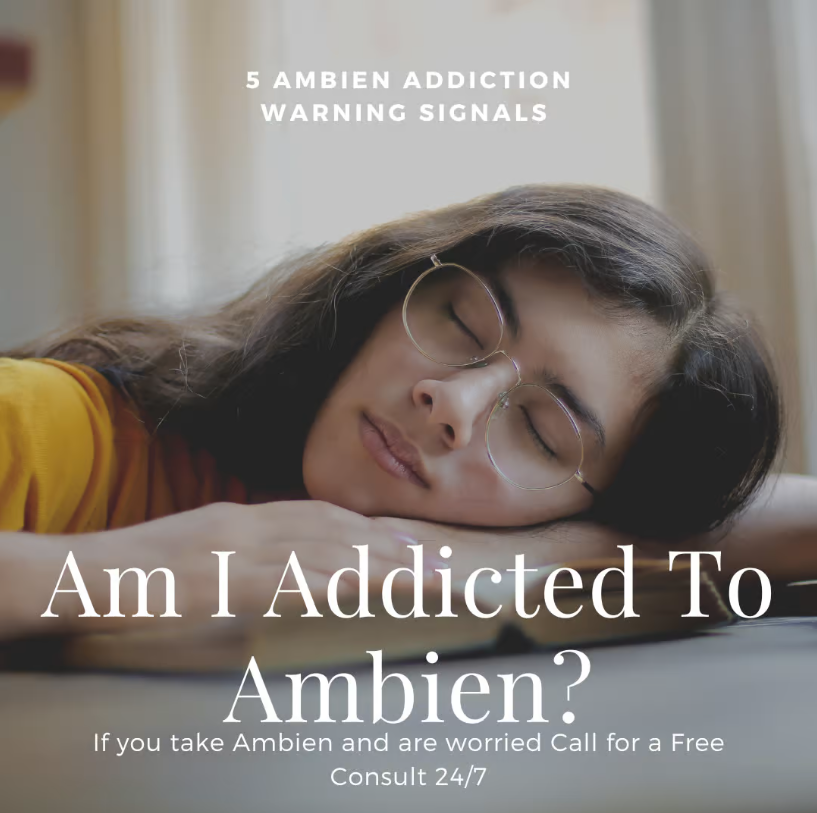
Skip To:
Learn More:
A medically supervised detox is the first step toward recovery from Ambien addiction. Detoxification aids in preventing withdrawal symptoms and recurrence.
Resources for Ambien detoxification and counseling to address the risk factors that contribute to Ambien usage are offered by We Level Up Texas Treatment Center. Reach out to treatment admissions today to learn more about your choices if you’re ready to stop abusing Ambien and are experiencing symptoms of addiction.
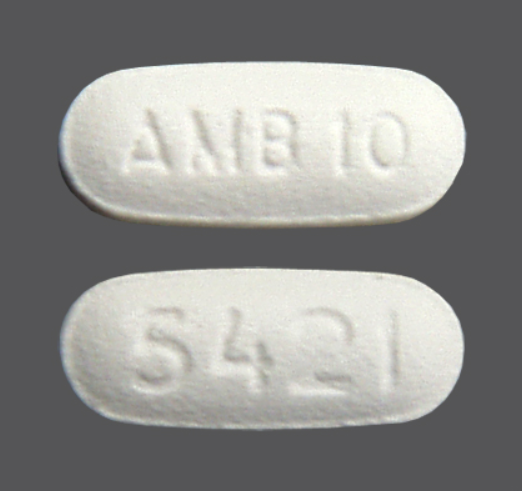
Understanding Ambien Addiction
Sedative hypnotics are the family of medications that includes Ambien. The neurotransmitter GABA is activated by Ambien, causing the brain and central nervous system (CNS) to slow down. It is only meant to be used temporarily to treat insomnia.
Ambien comes in two forms:
- An extended-release version that helps you stay asleep.
- A fast-release form that enables you to fall asleep.
To be addicted to Ambien can result from using any version. The goal of this non-benzodiazepine sleeping aid, which is also known by its slang term “Z-Drug,” is to provide the same level of medical efficacy as benzodiazepines, such as Xanax, without the risk or potential for addiction that these medications are notorious for.
The designers of Ambien created and promoted the drug as a less addictive substitute for benzodiazepines in treating severe insomnia.
Even while withdrawal from Ambien is typically less intense and deadly than that from Benzos, and it usually takes users longer to establish an addiction to Ambien than to Benzos, Ambien is nevertheless an addictive medication. It’s now known that Ambien and Benzos have comparable misuse potential.
Get Ambien addiction counseling that works. Discover professional help from We Level Up Texas’ addiction and mental health therapists. Start getting support with a free call to our addiction hotline.
Get Help. Get Better. Get Your Life Back.
Searching for Accredited Drug and Alcohol Rehab Centers Near You? We Level Up Texas Is Opening Soon!
Even if you have failed previously and relapsed, or are in the middle of a difficult crisis, we stand ready to support you. Our trusted behavioral health specialists will not give up on you. When you feel ready or just want someone to speak to about therapy alternatives to change your life call us. Even if we cannot assist you, we will lead you to wherever you can get support. There is no obligation. Call our network hotline today.
FREE Addiction Hotline – Call 24/7Top 5 Warning Signs of Ambien Addiction
Whether using Ambien as directed by a doctor or abusing it, a person can develop a physical dependence on the medication in as little as two weeks.
Tolerance, which happens when a person needs more of the medication to have the same effect, and withdrawal symptoms, which occur when a user stops taking the drug or lowers their dosage, are the two primary indicators of Ambien dependency. With time, it may develop into a severe Ambien addiction. Many don’t know they have a problem until they find they need significantly more medicine to fall asleep after stopping the prescription.
Here are the top 5 most common signs that someone has Ambien addiction.
1. Increased Tolerance
A simple episode of transient sleeplessness, or insomnia, is the starting point for most Ambien addictions. Because a doctor prescribes Ambien and is solely used as a sleep aid, some users fail to recognize the drug’s addictive potential. Ambien starts to lose effectiveness after more than a few weeks of use. Some users then get addicted to the medicine because their sleeplessness becomes unbearable, and they are unable to fall asleep without Ambien.
2. Persistent Cravings
When used recreationally, Ambien may function more as a stimulant that makes people feel happy and euphoric than as a sedative. Recreational users frequently take excessive dosages or misuse the medication by crushing and snorting it or combining it with alcohol. The danger of dependence and addiction is increased by recreational use and the combination of Ambien with other drugs.
Some signs of Ambien addiction that you can notice are:
- Refilling prescriptions unusually often.
- Obtaining prescriptions from multiple physicians.
- Repeatedly taking larger doses than prescribed.
- Experiencing cravings for Ambien.
- Engaging in dangerous situations without any memory of them later.
- Spending large amounts of money on the drug.
- Isolating oneself from family and friends.
- Illegally obtaining Ambien.
3. Difficulty Quitting
To assist patients in overcoming the consequences of insomnia, Ambien is a prescription sleep medication that serves a valid medical purpose.
However, just because doctors and therapists prescribe Ambien does not imply that it is a safer prescription than others. While the risks of long-term and addicts with addiction disorders need to be investigated, recent studies indicate that Ambien may not be as safe as the medical profession formerly thought.
Reluctantly giving off Ambien is a typical problem for those who are dependent on medication. It is frequently tough to stop using because of both psychological and physical reasons. Due to rising tolerance, those who rely on Ambien may find themselves stuck in a loop of increasing dosages. Even when one wants to stop using, the need to do so endures, and trying to stop could cause withdrawal symptoms, including restlessness, anxiety, and sleeplessness. Professional assistance is frequently needed to overcome this challenge because sudden stopping might cause significant withdrawal symptoms. Obtaining medical advice and implementing a stepwise reduction strategy can increase the likelihood of effectively stopping Ambien usage.
4. Continued Use Despite Consequences
Medical experts have stated that even though Ambien’s manufacturers have emphasized the medication’s advantages over benzodiazepines, users nonetheless run the danger of becoming addicted. In a research on sedative misuse that was released in 2015, addiction specialists noted that numerous sleeping drugs that aren’t benzodiazepines may be abused just as quickly. [1]
Ambien is classified as a Schedule IV drug. This indicates that recreational use of the drug is unlikely, according to the Drug Enforcement Agency (DEA). Nevertheless, because of the drug’s euphoric and hallucinogenic properties, many people have misused it.
Ambien’s addictive signs include:
- Problem sleeping without Ambien.
- Requiring more significant doses of Ambien to sleep.
- Abusing Ambien for non-medical reasons.
- Retreating from social activities because of Ambien usage.
- Expanded tolerance for Ambien.
- Experiencing Ambien withdrawal symptoms.
- Expending significant time and resources obtaining and using Ambien.
- Ambien abuse leads to deteriorating life, work, and school relationships and impacts daily life.
5. Ambien Withdrawal Symptoms
People go through withdrawal when they suddenly stop taking Ambien or cut back on their usage after consuming it heavily or for a lengthy period. Sleep is facilitated by the sedative-hypnotic Ambien (also known as zolpidem), which operates on the central nervous system. Detox symptoms arise from abruptly stopping use, whereas prolonged use builds reliance.
Beyond anxiety, restlessness, and tiredness, in more severe cases, there may be vomiting, delirium, seizures, nausea, and other symptoms. To minimize withdrawal symptoms and help the body adjust, it is recommended to reduce the dose under medical supervision gradually. A safe and successful Ambien withdrawal at this time is more likely if professional assistance is obtained.
A significant indicator of addiction is withdrawal. Ambien withdrawal symptoms include:
- Agitation.
- Panic or anxiety attacks.
- Tremors.
- Abdominal discomfort and cramping in the stomach.
- Delirium.
- Disorientation.
- Seizures.
- Restlessness.
- Hallucinations.
- Sickness or vomiting.
- Increased respiratory rate, pulse, or blood pressure.
- High fevers.
- Irritability.
- Insomnia.
- Sweating.
- Fatigue.
Long-term users should be cautious of the possibility of withdrawal. They may require a supervised tapering strategy to avoid these symptoms.
Ambien Overdose Warning
Ambien is meant to be taken immediately before bed, but some people have been known to take the drug hours before sleeping. This leads to a euphoria that washes away insecurity and self-conscious behavior. In some cases, the result of abusing Ambien could be a fatal overdose. Prolonged breathing or heartbeat strongly indicates the user is in trouble.
Other Ambien overdose symptoms include:
- Confusion.
- Extreme drowsiness.
- Slurred speech.
- Weakness.
- Unsteady movements.
- Slow or shallow breathing.
- Coma.
- Loss of consciousness.
- Blurred vision.
- Seizures.
- Nausea and vomiting.
- Low blood pressure.
- Respiratory failure.
- Cyanosis (bluish tint to the lips or skin).
- Cardiac arrest.
- Death.
When used excessively, Ambien’s strong CNS depressant effects might cause respiratory failure by lowering heart rate and breathing rates. A lethal overdose might occur from this. The user is in peril if their heartbeat or breathing is unusually sluggish.
You must seek emergency medical assistance right away if you think you or someone you know has overdosed on Ambien. Visit the closest emergency room or give your local emergency number a call. Don’t wait; getting medical help as soon as possible is necessary to treat signs of an Ambien overdose, including excessive sleepiness, breathing difficulties, or loss of consciousness.
If you’re seeking assistance with your rehab journey, reach out to a We Level Up Texas treatment professional today—your call is free and confidential.
Opening Soon! First-Class Facilities & Amenities
World-Class High-Quality Addiction & Mental Health Rehabilitation Treatment
Coming Soon! Rehab Centers TourRenowned Addiction Centers. Serene Private Facilities. Inpatient Rehab Programs Vary.
FREE Addiction Hotline – Call 24/7Proven recovery success experience, backed by a Team with History of:
- 15+ Years Experience
- 100s of 5-Star Reviews
- 10K+ Recovery Successes
- Low Patient to Therapist Ratio
- Onsite Medical Detox Center
- Comprehensive Dual-Diagnosis Treatment
- Complimentary Family & Alumni Programs
- Coaching, Recovery & Personal Development Events
Ambien Drug Interactions Chart
Alcohol is among the most common drugs that are taken with Ambien. As a person’s tolerance to Ambien increases, they frequently require increasing dosages of the medication to go to sleep. Some individuals who have developed an alcohol tolerance while taking Ambien combine the two drugs to increase the soothing effects. The CNS is depressed by both medicines, which makes this risky.
A few people have also used Ambien with benzodiazepines, such as Valium. The fact that Ambien and Benzos are both CNS depressants makes this particularly risky. The likelihood of both a deadly overdose and respiratory failure increases significantly when the two are combined.
Here’s a drug interaction chart for Ambien, including potential complications:
| Drug Name | Type of Interaction | Potential Consequences | Complications |
|---|---|---|---|
| Benzodiazepines | Central Nervous System (CNS) | Increased sedation and respiratory depression | Risk of excessive sedation and impaired breathing |
| Alcohol | Central Nervous System (CNS) | Enhanced sedation and impaired coordination | Increased risk of accidents; respiratory depression |
| Antidepressants | Central Nervous System (CNS) | Increased risk of sedation and drowsiness | Potential for cognitive impairment and falls |
| Antipsychotics | Central Nervous System (CNS) | Enhanced sedative effects | Increased sedation and potential respiratory issues |
Ambien Addiction Infographics
The infographic below provides information about Ambien, a prescription medication designed to treat insomnia by promoting faster and more regular sleep. Ambien is classified as a sedative-hypnotic, acting on the central nervous system to produce a calming effect.
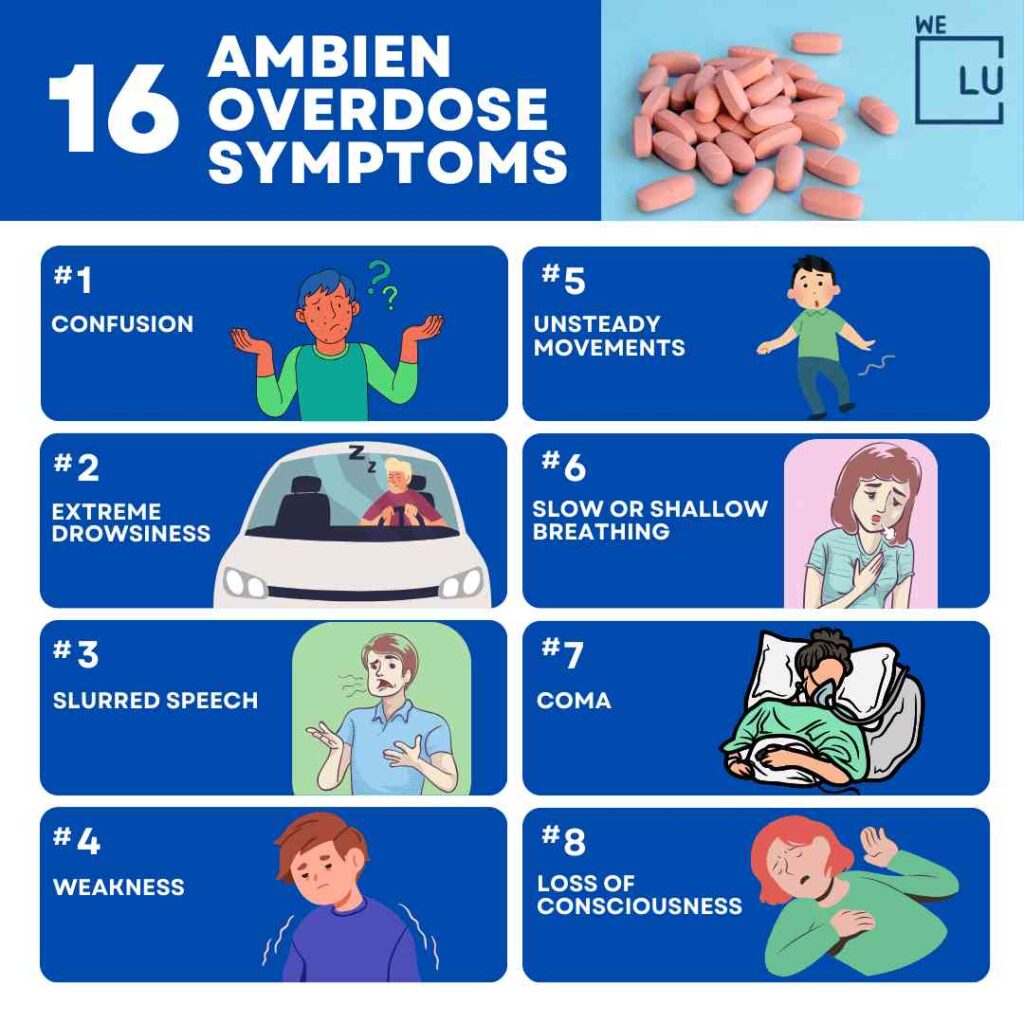
Embed the above “16 Ambien Overdose Symptoms 1” Infographic to your Website. This infographic is provided by the We Level Up Addiction Treatment Center team. To use the above infographics, you agree to link back and attribute its source and owner at https://weleveluptx.com/is-ambien-addictive/
16 Ambien Overdose Symptoms 1 image link: https://weleveluptx.com/wp-content/uploads/2024/03/Serious-Side-Effects-of-Adderall-Adderall-Addiction-Adderall-Side-Effects-Adderall-Withdrawal-1024×1024.jpg
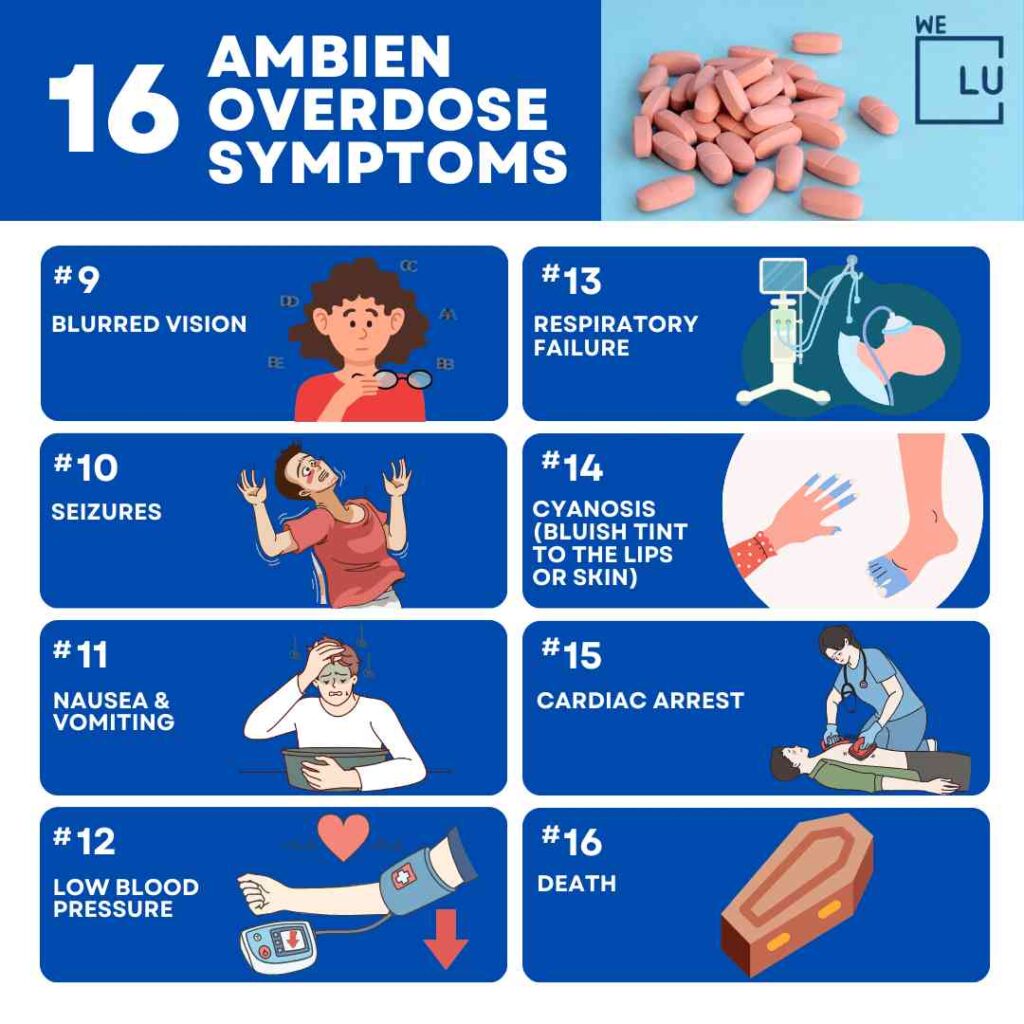
Embed the above “16 Ambien Overdose Symptoms 2” Infographic to your Website. This infographic is provided by the We Level Up Addiction Treatment Center team. To use the above infographics, you agree to link back and attribute its source and owner at https://weleveluptx.com/is-ambien-addictive/
16 Ambien Overdose Symptoms 2 image link: https://weleveluptx.com/wp-content/uploads/2024/03/16-Ambien-Overdose-Symptoms-2-Ambien-Addiction-Is-Ambien-Addictive-Ambien-Side-Effects-Ambien-Overdose-1024×1024.jpg
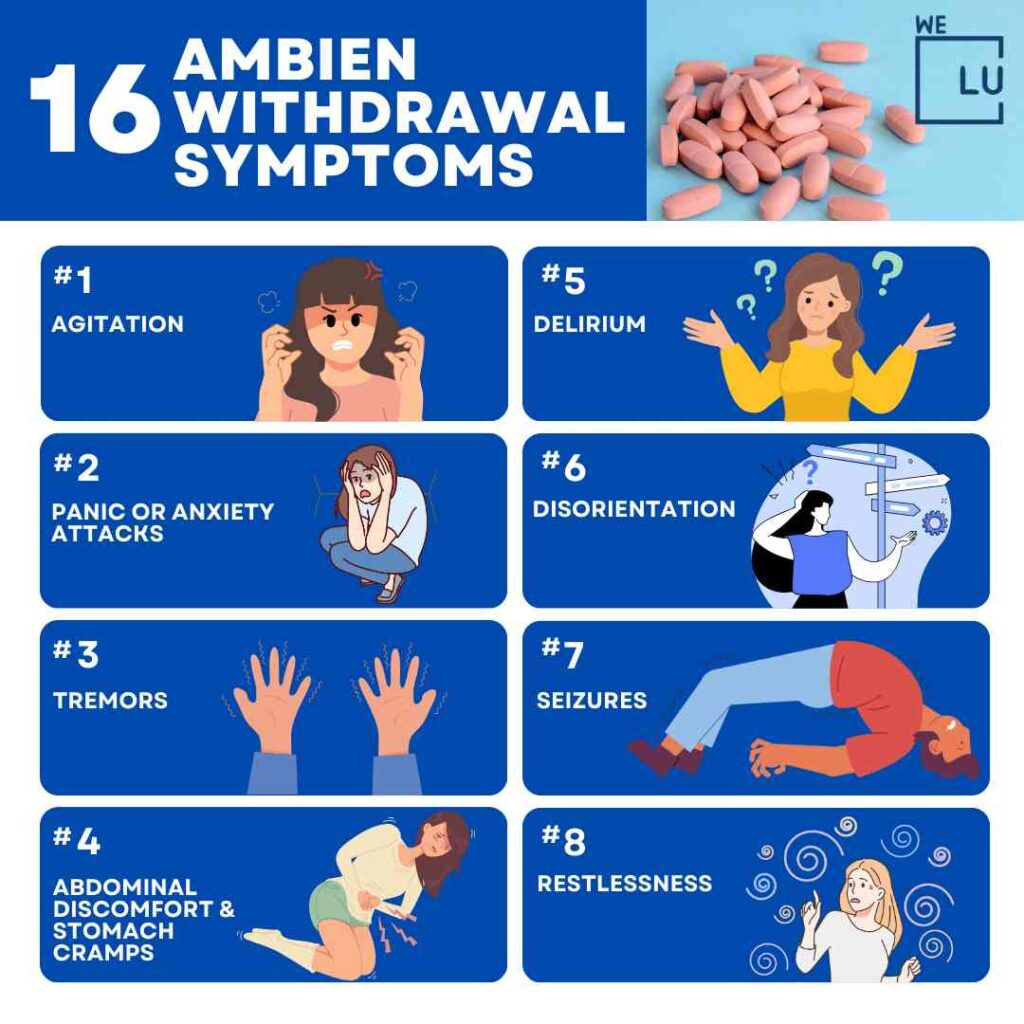
Embed the above “16 Ambien Withdrawal Symptoms 1” Infographic to your Website. This infographic is provided by the We Level Up Addiction Treatment Center team. To use the above infographics, you agree to link back and attribute its source and owner at https://weleveluptx.com/is-ambien-addictive/
16 Ambien Withdrawal Symptoms 1 image link: https://weleveluptx.com/wp-content/uploads/2024/03/16-Ambien-Withdrawal-Symptoms-1-Ambien-Addiction-Is-Ambien-Addictive-Ambien-Side-Effects-Ambien-Overdose-1024×1024.jpg
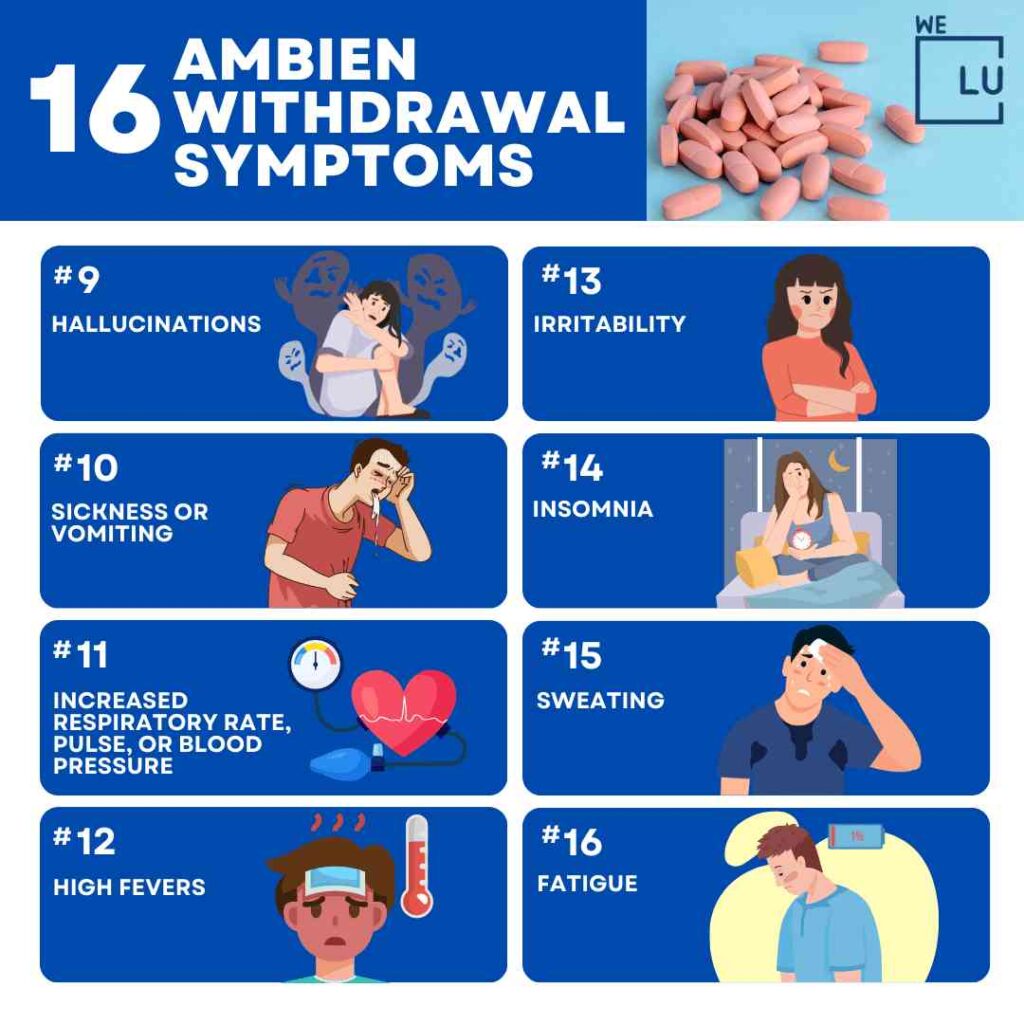
Embed the above “16 Ambien Withdrawal Symptoms 2” Infographic to your Website. This infographic is provided by the We Level Up Addiction Treatment Center team. To use the above infographics, you agree to link back and attribute its source and owner at https://weleveluptx.com/is-ambien-addictive/
16 Ambien Withdrawal Symptoms 2 image link: https://weleveluptx.com/wp-content/uploads/2024/03/16-Ambien-Withdrawal-Symptoms-2-Ambien-Addiction-Is-Ambien-Addictive-Ambien-Side-Effects-Ambien-Overdose-1024×1024.jpg
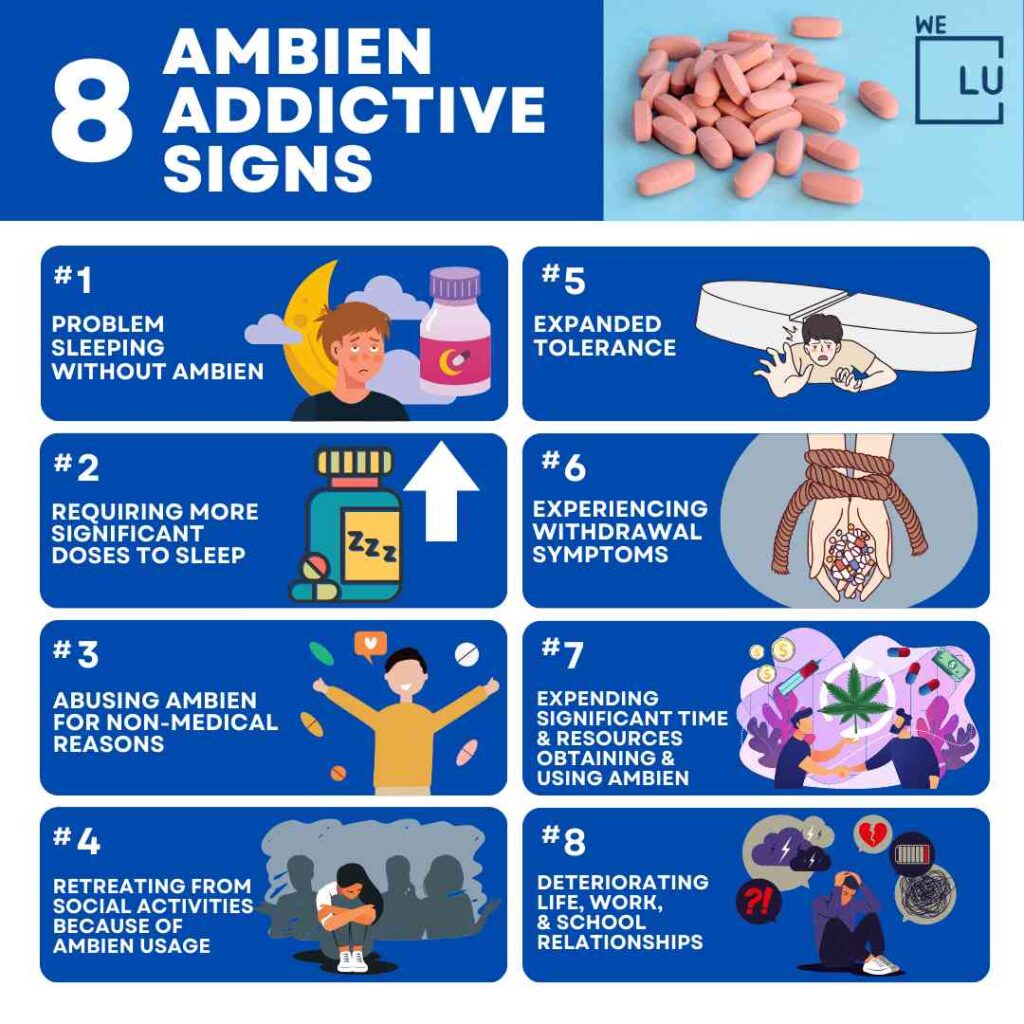
Embed the above “8 Ambien Addictive Signs” Infographic to your Website. This infographic is provided by the We Level Up Addiction Treatment Center team. To use the above infographics, you agree to link back and attribute its source and owner at https://weleveluptx.com/is-ambien-addictive/
8 Ambien Addictive Signs image link: https://weleveluptx.com/wp-content/uploads/2024/03/Ambien-Addictive-Signs-Ambien-Addiction-Is-Ambien-Addictive-Ambien-Side-Effects-Ambien-Overdose-1-1024×1024.jpg
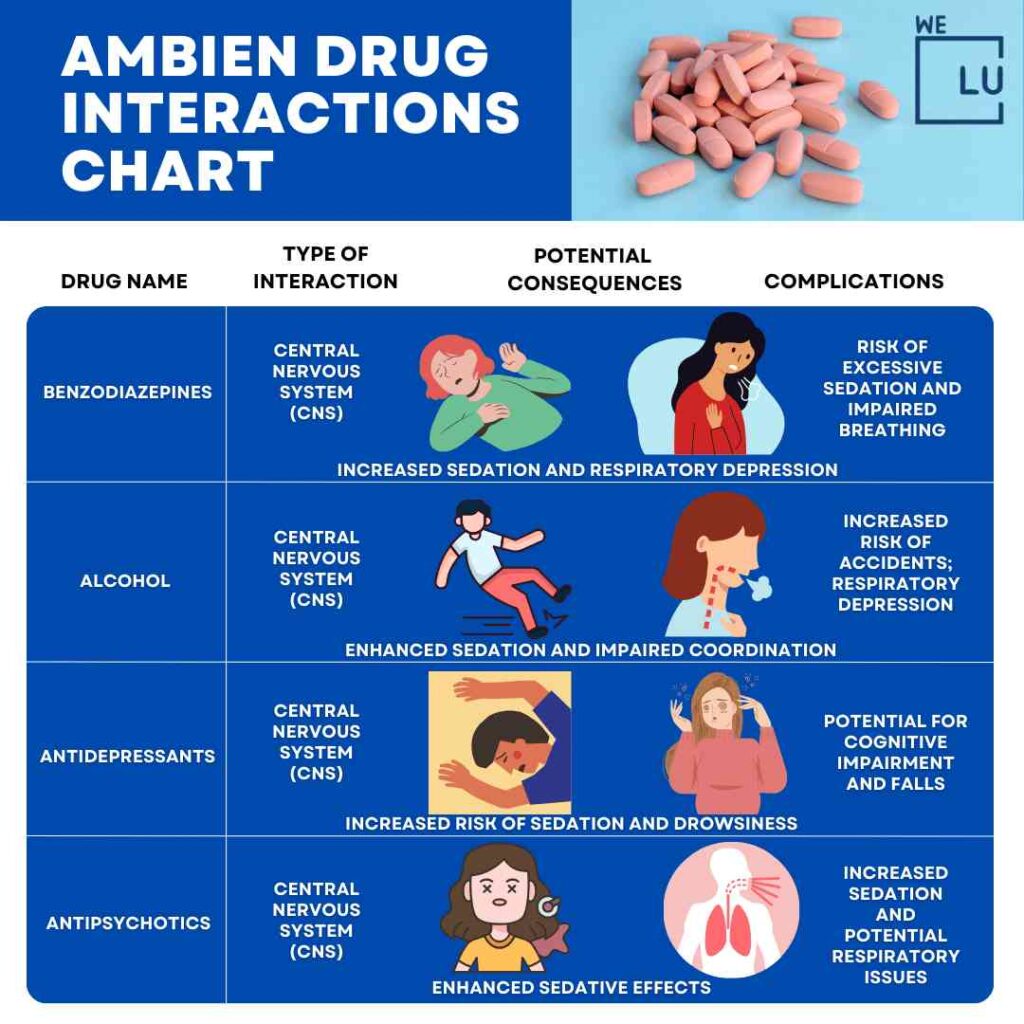
Embed the above “Ambien Drug Interactions Chart” Infographic to your Website. This infographic is provided by the We Level Up Addiction Treatment Center team. To use the above infographics, you agree to link back and attribute its source and owner at https://weleveluptx.com/is-ambien-addictive/
Ambien Drug Interactions Chart image link: https://weleveluptx.com/wp-content/uploads/2024/03/Ambien-Drug-Interactions-Chart-Ambien-Addiction-Is-Ambien-Addictive-Ambien-Side-Effects-Ambien-Overdose-1024×1024.jpg
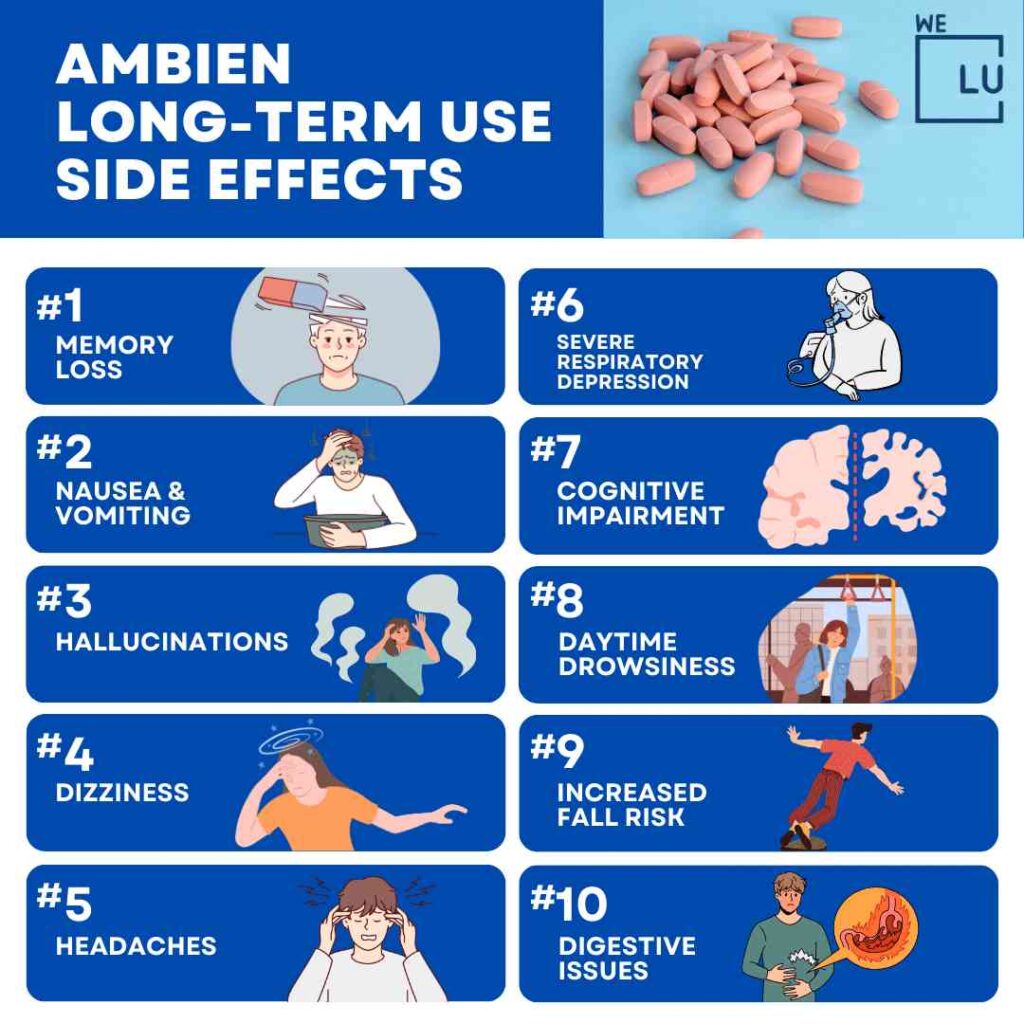
Embed the above “Ambien Long-Term Use Side Effects 1” Infographic to your Website. This infographic is provided by the We Level Up Addiction Treatment Center team. To use the above infographics, you agree to link back and attribute its source and owner at https://weleveluptx.com/is-ambien-addictive/
Ambien Long-Term Use Side Effects 1 image link: https://weleveluptx.com/wp-content/uploads/2024/03/Ambien-Long-Term-Use-Side-Effects-1-Ambien-Addiction-Is-Ambien-Addictive-Ambien-Side-Effects-Ambien-Overdose-1024×1024.jpg
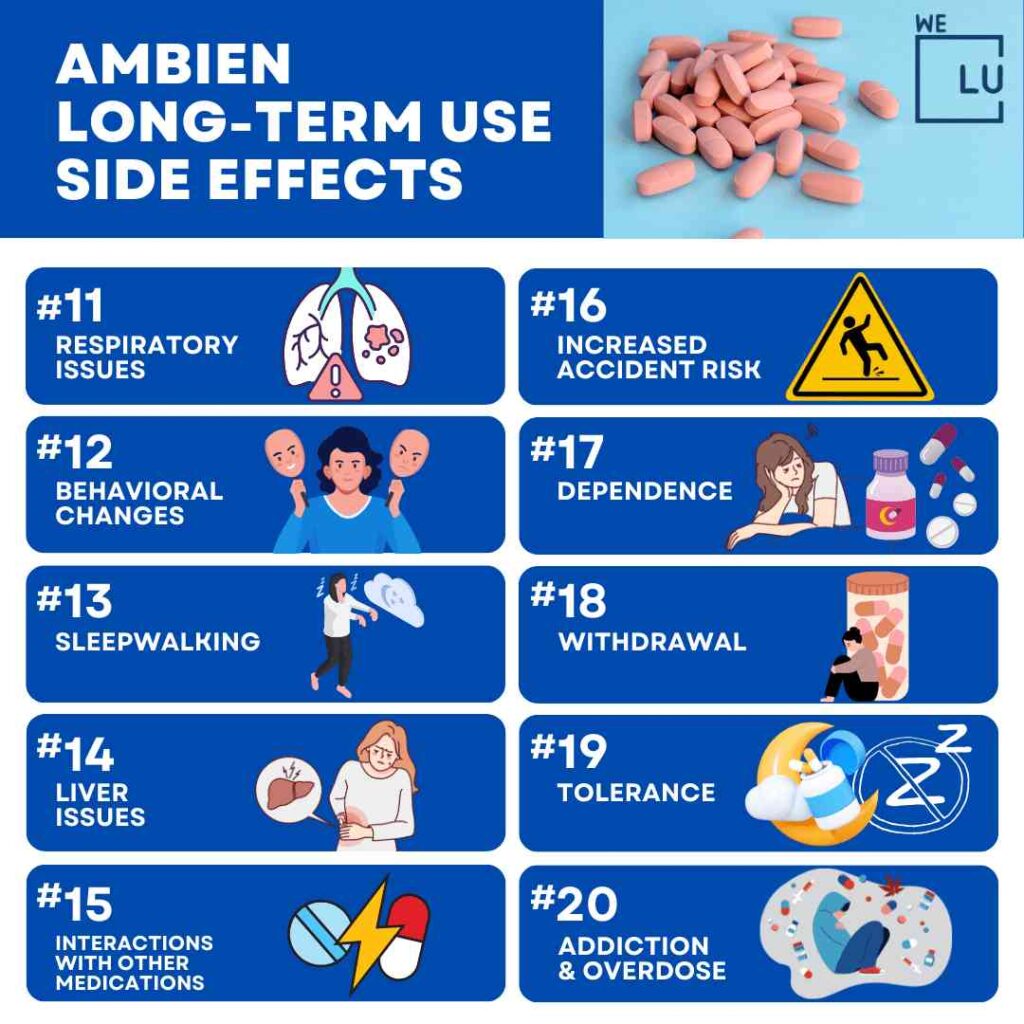
Embed the above “Ambien Long-Term Use Side Effects 2” Infographic to your Website. This infographic is provided by the We Level Up Addiction Treatment Center team. To use the above infographics, you agree to link back and attribute its source and owner at https://weleveluptx.com/is-ambien-addictive/
Ambien Long-Term Use Side Effects 2 image link: https://weleveluptx.com/wp-content/uploads/2024/03/Ambien-Long-Term-Use-Side-Effects-1-Ambien-Addiction-Is-Ambien-Addictive-Ambien-Side-Effects-Ambien-Overdose-1024×1024.jpg
Ambien Addiction Treatment
Because of the many ways that inpatient therapy helps to create a more regulated and encouraging atmosphere, it is highly advised for Ambien addiction. Relapse during the early phases of rehabilitation is less likely in the controlled setting because it limits external stimuli and distractions.
Further guaranteeing a secure and efficient detoxification procedure and handling any difficulties or withdrawal symptoms is the availability of medical monitoring around the clock.
Ambien may be tapered slowly and under medical supervision in an organized inpatient environment, which makes the withdrawal process more accessible to handle and more gradual. To provide people with a greater degree of care and support while they navigate the difficulties of eliminating Ambien dependency and building a foundation for sustained recovery, this all-encompassing approach takes into account both the medical and psychological elements of Ambien addiction.
We Level Up Texas Ambien Addiction Rehab
Ensure you continue practicing good diet and exercise habits as you detox from Ambien. This is essential for your body and mind to overcome obstacles. Entertainment may also be a helpful diversion from symptoms, and at our rehab facilities, we provide a variety of activities, refreshing foods, and calm environments to aid with your recovery.
Our innovative detox rooms and 24-hour nurse care guarantee a secure and cozy setting for relaxation and healing. You may take part in on-site activities like group therapy, seminars, and workshops at a We Level Up Texas facility while going through detox. These sessions can provide you with essential insights into your substance use disorder and long-term recovery techniques.
After an Ambien detox at We Level Up Texas Addiction Treatment Center, patients can receive assistance from a variety of treatment programs. Different degrees of treatment, including inpatient care, are available. Depending on your home environment, motivation, past experiences with addiction and recovery, and current state of recovery, your addiction treatment team will suggest a degree of care.
Are you seeking Ambien rehab centers near me? Get a free rehab insurance check without any obligation. The result can help you explore several treatment options.
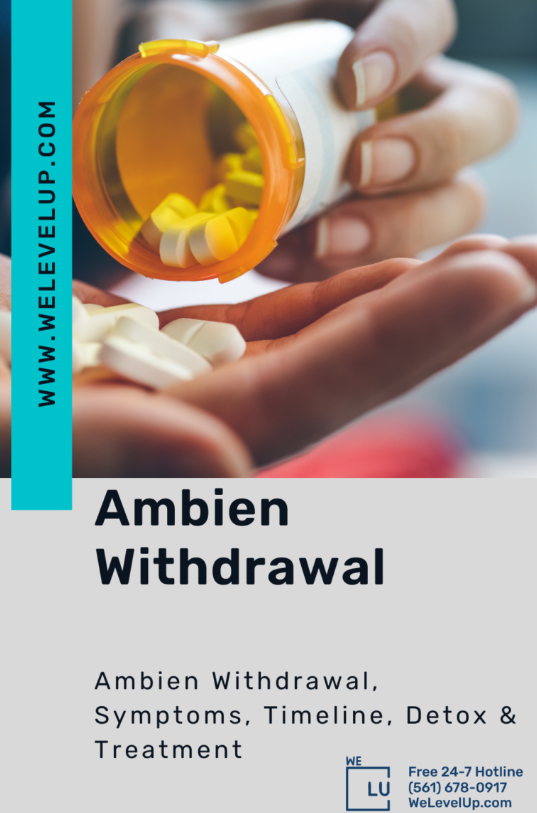
Prescription Medication Addiction Recovery and Sobriety Story | Testimonial Video
Start a New Life
Begin with a free call to an addiction & behavioral health treatment advisor. Learn more about our dual-diagnosis programs. The We Level Up treatment center network delivers recovery programs that vary by each treatment facility. Call to learn more.
- Personalized Care
- Caring Accountable Staff
- World-class Amenities
- Licensed & Accredited
- Renowned w/ 100s 5-Star Reviews
We’ll Call You
Search We Level Up Texas Is Ambien Addictive? Addiction Treatment Topics and Resources
Sources
- Bouchette D, Akhondi H, Quick J. Zolpidem. [Updated 2022 Oct 1]. In: StatPearls [Internet]. Treasure Island (FL): StatPearls Publishing; 2023 Jan-. Available from: https://www.ncbi.nlm.nih.gov/books/NBK442008/
- Heydari M, Isfeedvajani MS. Zolpidem dependence, abuse and withdrawal: A case report. J Res Med Sci. 2013 Nov;18(11):1006-7. PMID: 24520235; PMCID: PMC3906775.
- Mattoo SK, Gaur N, Das PP. Zolpidem withdrawal delirium. Indian J Pharmacol. 2011 Nov;43(6):729-30. Doi: 10.4103/0253-7613.89838. PMID: 22144786; PMCID: PMC3229797.
- Haji Seyed Javadi SA, Hajiali F, Nassiri-Asl M. Zolpidem dependency and withdrawal seizure: a case report study. Iran Red Crescent Med J. 2014 Nov 11;16(11):e19926. Doi: 10.5812/ircmj.19926. PMID: 25763219; PMCID: PMC4329938.
- Orsolini L, Chiappini S, Grandinetti P, Bruschi A, Testa R, Provenzano A, Berardis D, Volpe U. ‘Z-trip’? A Comprehensive Overview and a Case-series of Zolpidem Misuse. Clin Psychopharmacol Neurosci. 2021 May 31;19(2):367-387. Doi: 10.9758/cpn.2021.19.2.367. PMID: 33888666; PMCID: PMC8077048.
- Garnier R, Guerault E, Muzard D, Azoyan P, Chaumet-Riffaud AE, Efthymiou ML. Acute zolpidem poisoning–analysis of 344 cases. J Toxicol Clin Toxicol. 1994;32(4):391-404. Doi: 10.3109/15563659409011040. PMID: 8057398.
- Inagaki T, Miyaoka T, Tsuji S, Inami Y, Nishida A, Horiguchi J. Adverse reactions to zolpidem: case reports and a literature review. Prim Care Companion J Clin Psychiatry. 2010;12(6):PCC.09r00849. Doi: 10.4088/PCC.09r00849bro. PMID: 21494350; PMCID: PMC3067983.
- Ambien Label – accessdata.fda.gov – Food and Drug Administration (FDA) https://www.accessdata.fda.gov/drugsatfda_docs/label/2008/019908s027lbl.pdf
- Zolpidem: MedlinePlus Drug Information – MedlinePlus (.gov) U.S. Department of Health and Human Services National Institutes of Health
- Emergency Department Visits for Adverse Reactions Involving the Insomnia Medication Zolpidem – Substance Abuse and Mental Health Services Administration (SAMHSA) https://www.samhsa.gov/data/sites/default/files/DAWN079/DAWN079/sr079-Zolpidem.htm

